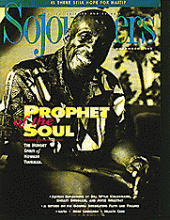Sometime before his death, Arthur Ashe was asked a question: If he could spend an evening with three of the most important persons in all of history, who would they be? He named Jesus, Albert Einstein, and Howard Thurman. Jesus is known as the central figure of the Christian religion, Albert Einstein as a central figure in science and philosophy, but who is Howard Thurman? Why would Arthur Ashe include him among such an esteemed trio?
Howard Thurman was a philosopher and theologian, mentor to many of the civil rights leaders of the 20th century, and author of 26 books and numerous religious articles. He served as dean of the chapels at Howard University in Washington, D.C., and Boston University, as well as co-founder and pastor of the Church for the Fellowship of All Peoples in San Francisco (the first interracial, interfaith church in the United States).
Called "seminal" by some, Thurman's ideas have been the focus of a number of scholars pursuing doctorates, but curiously few modern theologians (except for African Americans) have explored his thought. This would suggest that his appeal is limited to people of color. That is too bad, because his viewpoint and appeal transcends any particular racial or religious orientation.
ALTHOUGH I HAD KNOWN of Thurman for a number of years, our first meeting took place in San Francisco in 1977, when he invited me to his home. We became friends immediately, our contacts becoming more sustained as I became a staff member at Fellowship Church, then executive director of the Howard Thurman Educational Trust.
Read the Full Article

